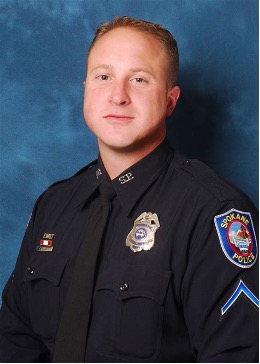Building the Off-Ramp: Quality Connections to Care
At each point in the criminal justice system, from initial contact with law enforcement to community supervision, there are opportunities to divert people with mental health and substance use conditions away from the criminal justice system and into community-based treatment and support. This session will feature communities that have successfully built a broad range of community-based services to answer the “divert to where?” question. These communities will describe how they determined which community-based services to build; how those services function as effective diversion opportunities; and the successful outcomes they have achieved, such as reducing the number of people with behavioral health conditions in their local jails.

Ashley Krider, Senior Project Associate, Policy Research Associates
Ashley Krider, MS, has been employed at Policy Research Associates since 2012. As a Senior Project Associate, Ms. Krider coordinates training and technical assistance to the John D. and Catherine T. MacArthur Foundation’s Safety and Justice Challenge, providing support to local leaders across the country to address over-incarceration in jails, with a focus on individuals with behavioral health disorders. She has also been part of PRA’s work with the Trueblood competency evaluation and restoration Settlement in Washington State, providing assistance and strategic planning around implementation of the state’s Diversion Services Plan and court compliance priorities, and working with high utilizer sites to implement diversion and reentry programs. She previously focused on SAMHSA’s GAINS Center for Behavioral Health and Justice Transformation, coordinating the national solicitation and delivery of criminal justice and trauma-related trainings, facilitating Sequential Intercept Mapping (SIM) workshops, as well as providing training and technical assistance to SAMHSA grantees. She also facilitated the planning and conduction of national policy academies focused on criminal justice and behavioral health issues including reducing incarceration, tribal justice and law enforcement issues, and reentry from the justice system. Prior to joining PRA, she worked in forensic services at the New York State Office of Mental Health. She has a Bachelor of Arts in Counseling and a Master of Science in Forensic Mental Health from Sage Graduate School in Albany, NY.

Robert Sullivan, Director of Corrections, Johnson County, KS
Robert Sullivan has served as the director of Johnson County’s Department of Corrections since January 2018, where he oversees adult and juvenile probation, a 69-bed juvenile detention center, the juvenile intake and assessment center, adult and juvenile electronic monitoring, and a 398-bed adult residential center. Before becoming the director of Corrections, Sullivan served as the criminal justice coordinator. As coordinator, his primary duties were to provide internal support for the County Manager’s Office on criminal justice-related activities and serve as the staff liaison and coordinator for the Johnson County Criminal Justice Advisory Council. Before coming to Johnson County in January 2015, Sullivan served for 10 years as the director of Community Corrections in Lyon County, Kansas.

Tim DeWeese, Director of Johnson County Mental Health Center, Johnson County, KS
Tim DeWeese is the director of Johnson County Mental Health Center. The Mental Health Center is a department of the Johnson County (KS) Government and employs more than 340 staff who provide behavioral health services to nearly 10,000 county residents annually. DeWeese is a licensed mental health professional in Kansas and has over 30 years of experience in community mental health, where he has worked in various capacities. He possesses extensive knowledge and experience in the public mental health delivery system, client-centered leadership, and program design/development. DeWeese also served more than 10 years as a commissioned officer in the Army Reserve and National Guard. He has a BS in psychology from Missouri Southern State University and a master of social work administration from the University of Kansas.

Rachael Eisenberg, Director, Office of Criminal Justice, Philadelphia, PA
Rachael Eisenberg is a Philadelphia native committed to advancing fairness and equity in the City’s criminal justice system. Ms. Eisenberg currently serves as the Director of the City of Philadelphia’s Office of Criminal Justice. In this role, she oversees the City’s efforts to advance racial equity in criminal justice system, foster meaningful community engagement in justice reform efforts, increase early diversion and deflection away from the criminal and juvenile justice system, and safely reduce the local jail population. Previously, Ms. Eisenberg worked as a law clerk for the First Judicial District of Pennsylvania, where she developed and implemented a court-based mentoring and reentry program. Ms. Eisenberg also served as a Policy Assistant for the Defender Association of Philadelphia, working on juvenile justice reform projects in the areas of indigent defense and disproportionate minority contact. Ms. Eisenberg graduated Magna Cum Laude from Temple University Beasley School of Law in 2014 and is currently licensed to practice law in Pennsylvania. She also received her Bachelor of Arts in Psychology from Cornell University in 2009.

Jan Tokumoto, Chief Operating Officer, Spokane, WA – Frontier Behavioral Health
Jan Tokumoto, MEd, is the chief operating officer at Frontier Behavioral Health (FBH) where she has clinical and operational oversight of outpatient, crisis response services, and programs funded by a class-action lawsuit known as Trueblood. In 2000, Tokumoto collaborated with the Spokane Police Department to provide Crisis Intervention Team (CIT) training to law enforcement personnel. Within the last four years, Enhanced CIT training was offered to co-responder teams using motivational interviewing, an evidence-based best practice, as its communication tool. Tokumoto has provided training on topics such as crisis intervention, suicide, and homicide risk assessment, diversity/equity/inclusivity, mass shooting, and trauma-informed care.

Sgt. Jay Kernkamp, BH Unit Supervisor, Spokane, WA
Sgt. Jay Kernkamp is a Spokane native who started his law enforcement career as a volunteer for the Spokane Police Department. He then worked full-time for Whitman County before lateraling to the Spokane Police Department. This is where he has spent the last 16 years of his career. He has worked in a variety of fields, including the Regional Drug Task Force, Anti-crime Team, SWAT, and the department’s peer support team. He is currently the supervisor of the Behavioral Health Unit and its co-deployed team. He graduated with a BA in social psychology from Whitworth University.

